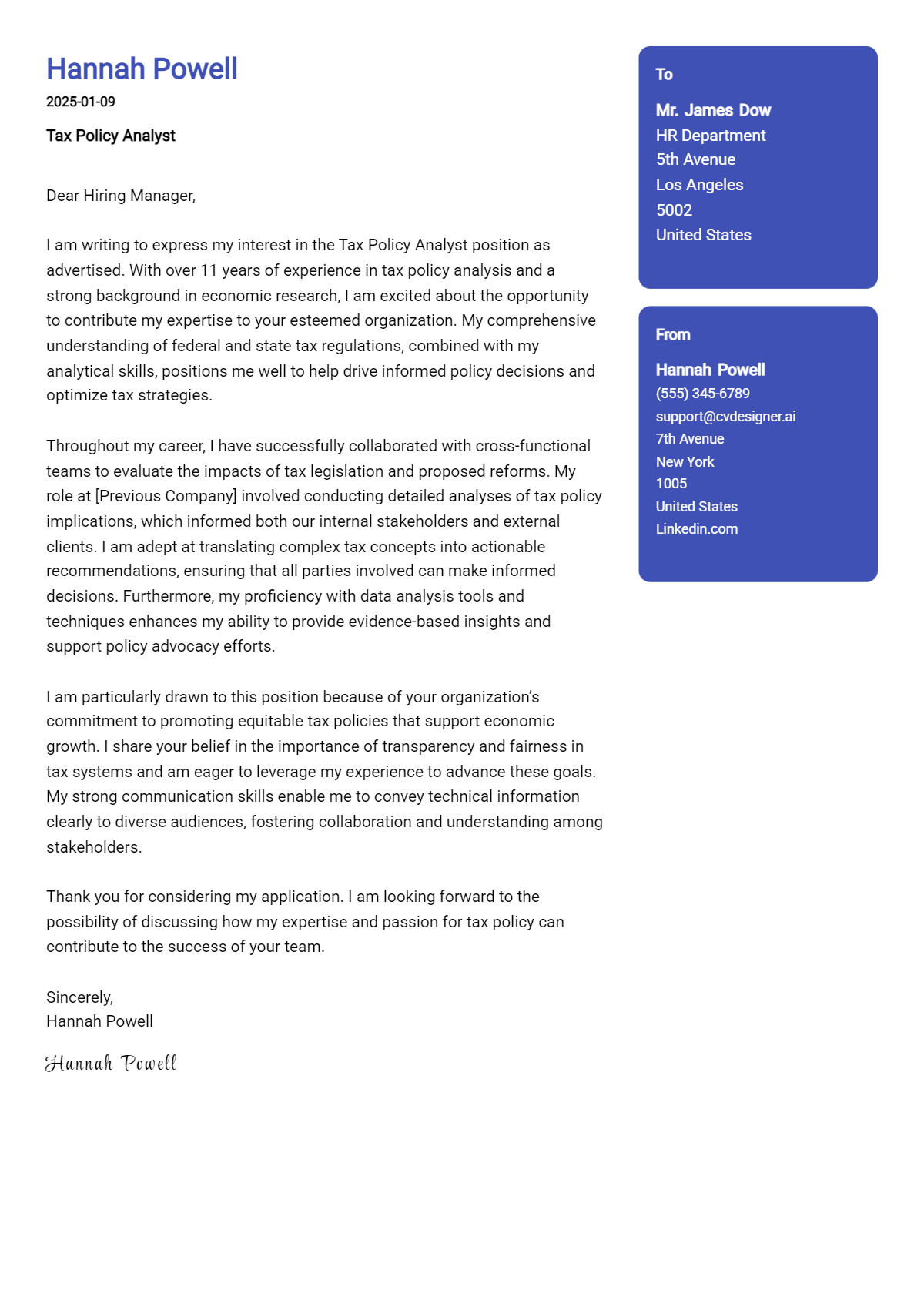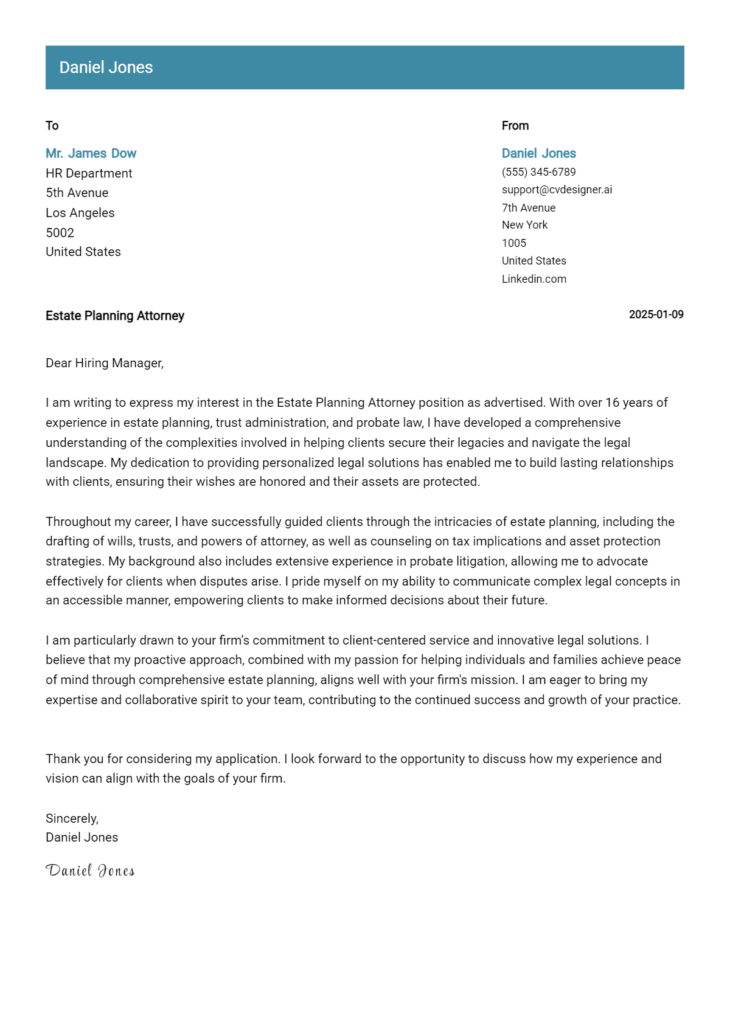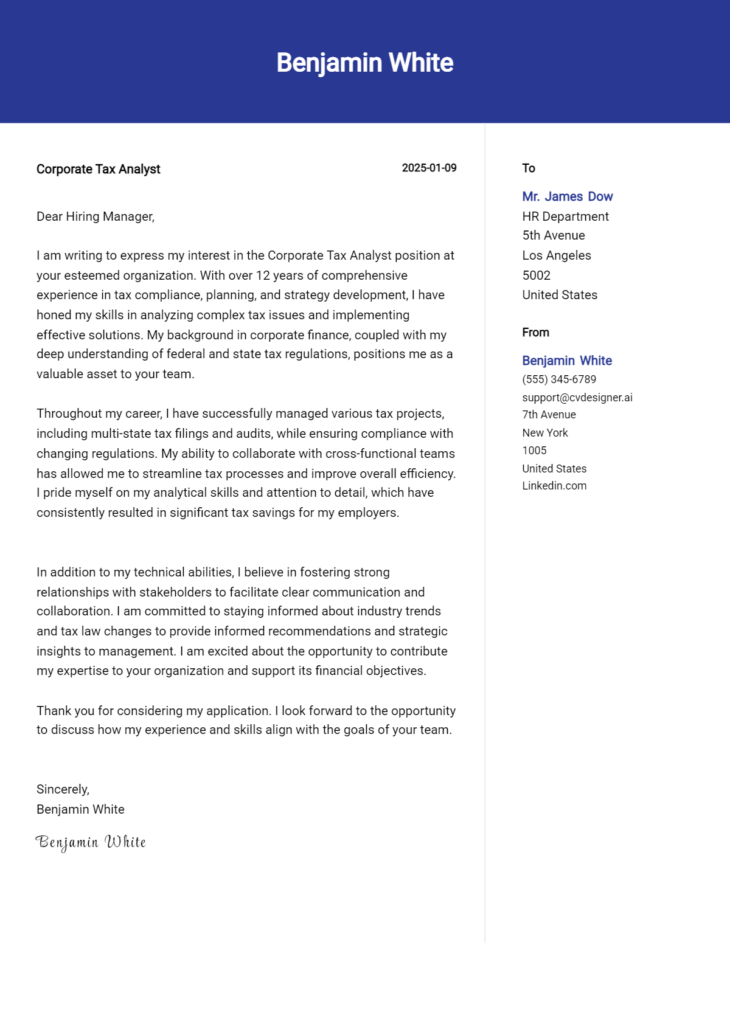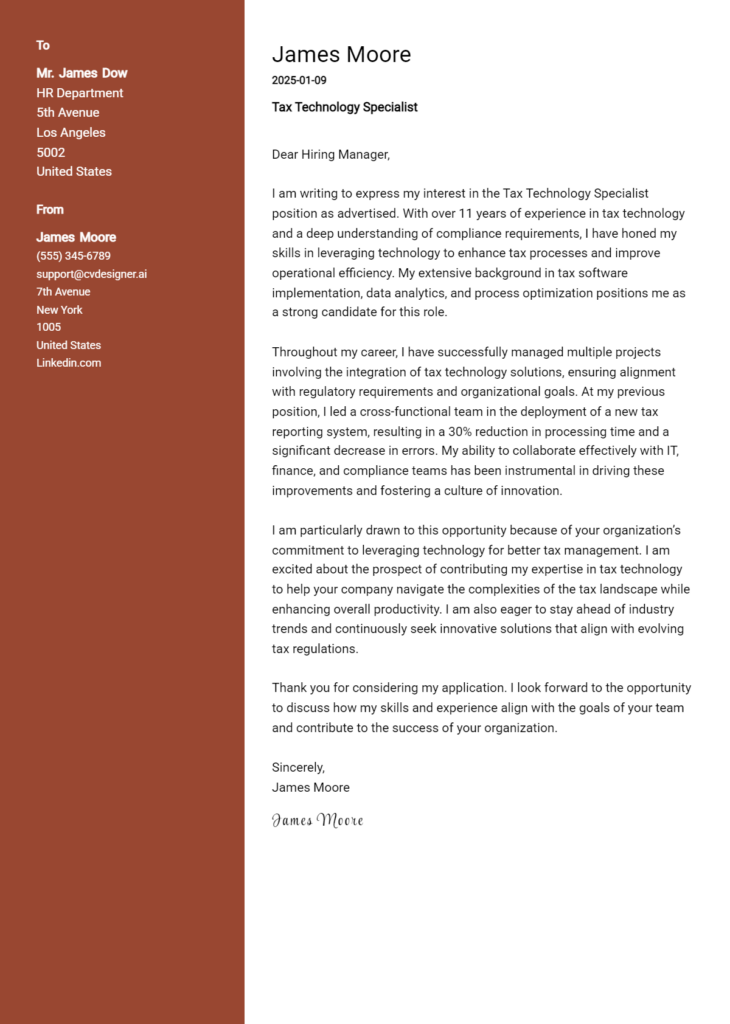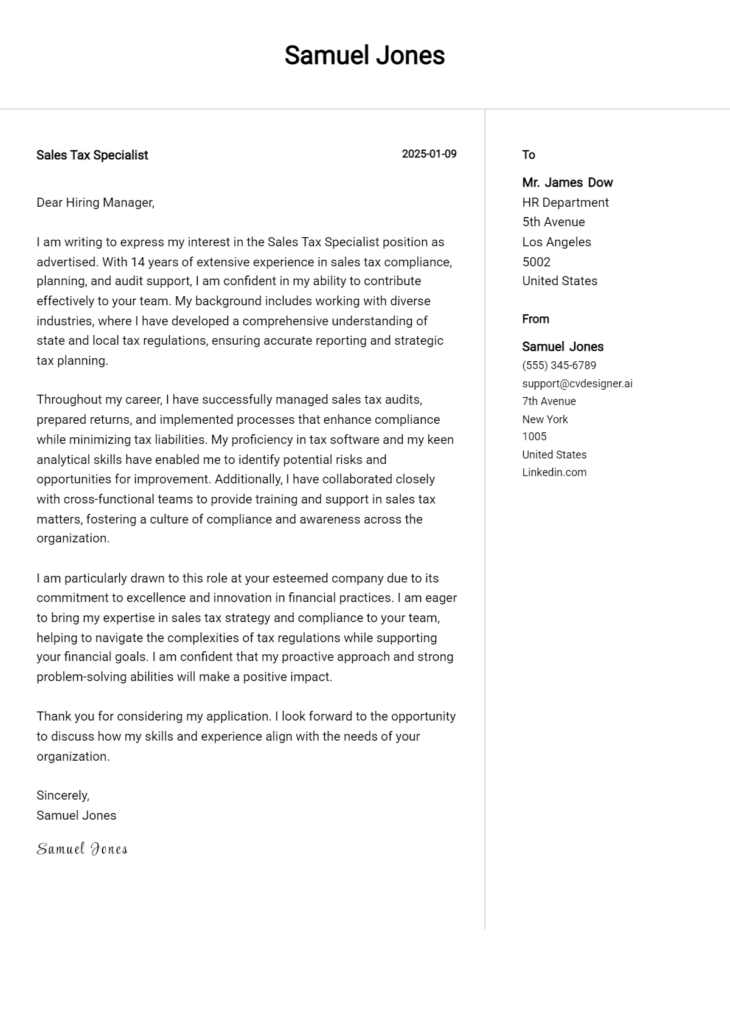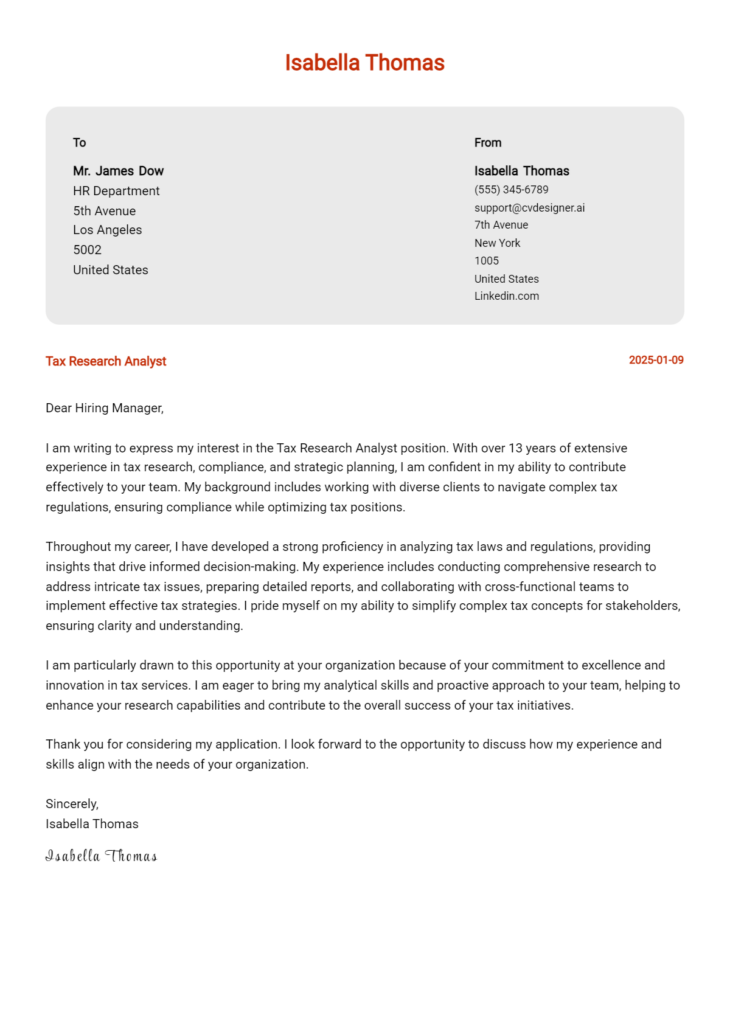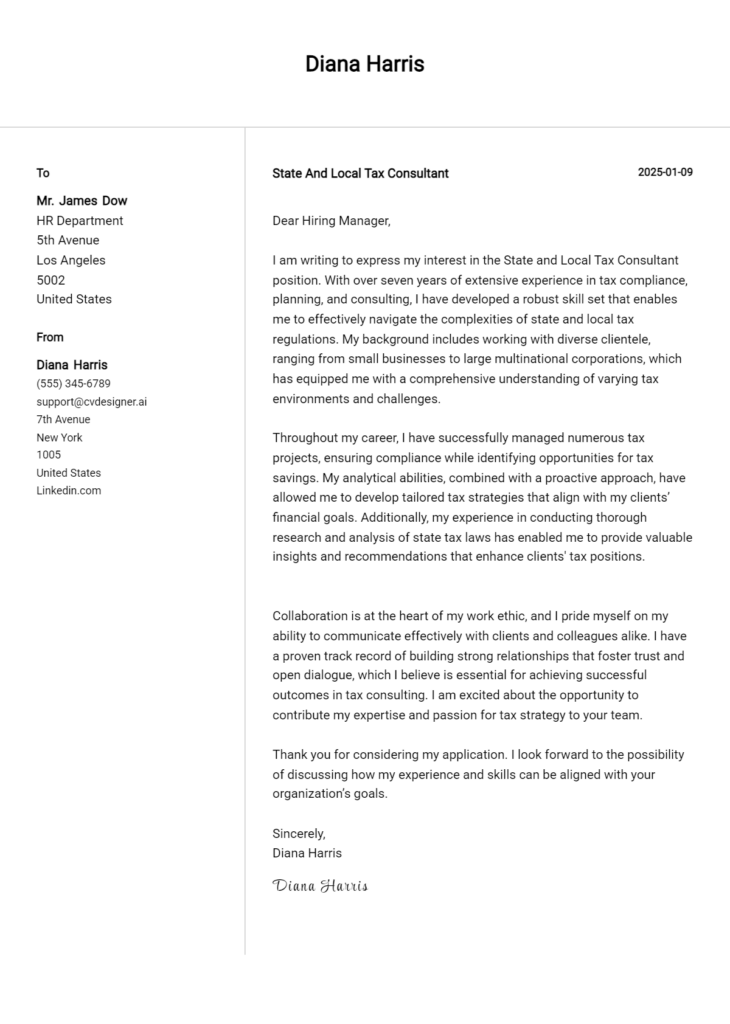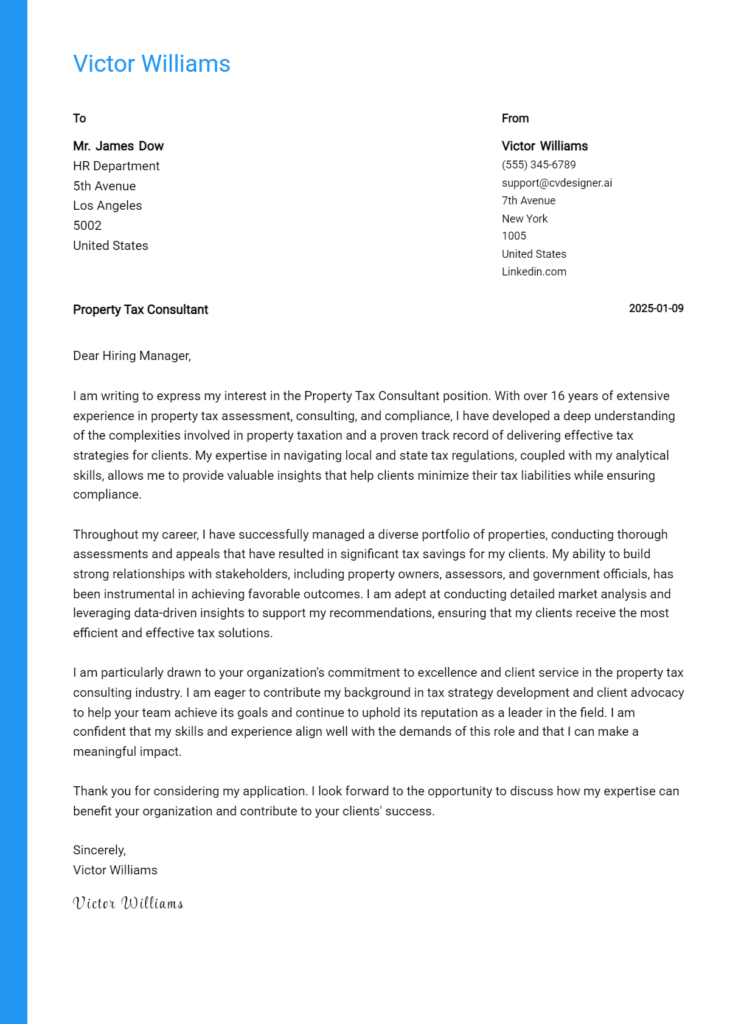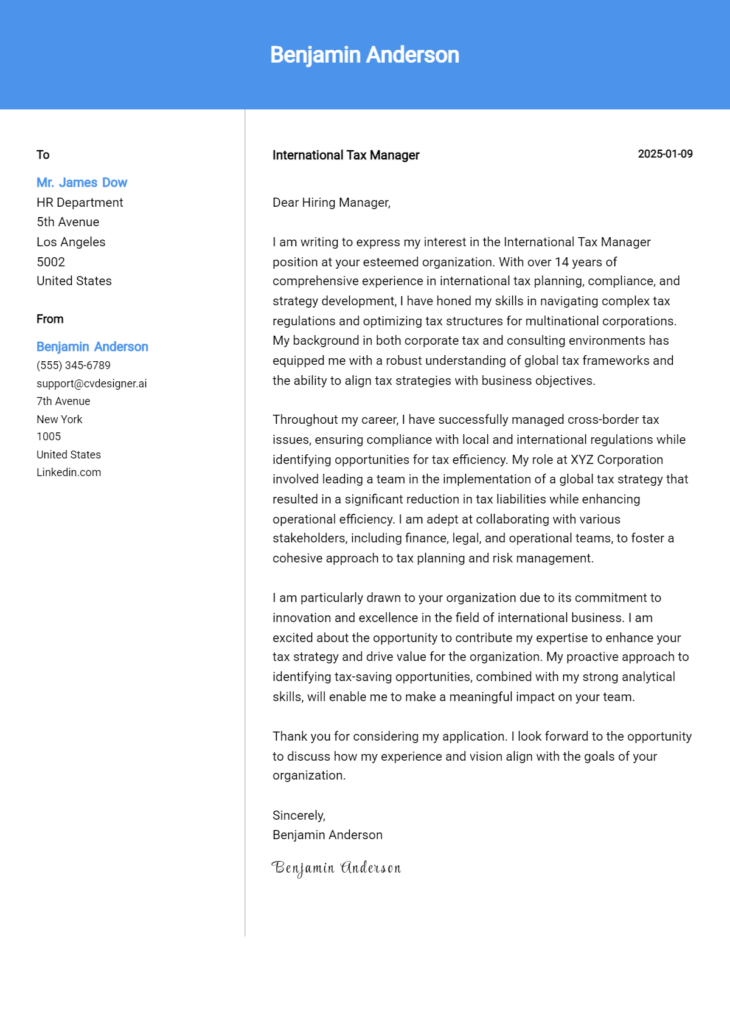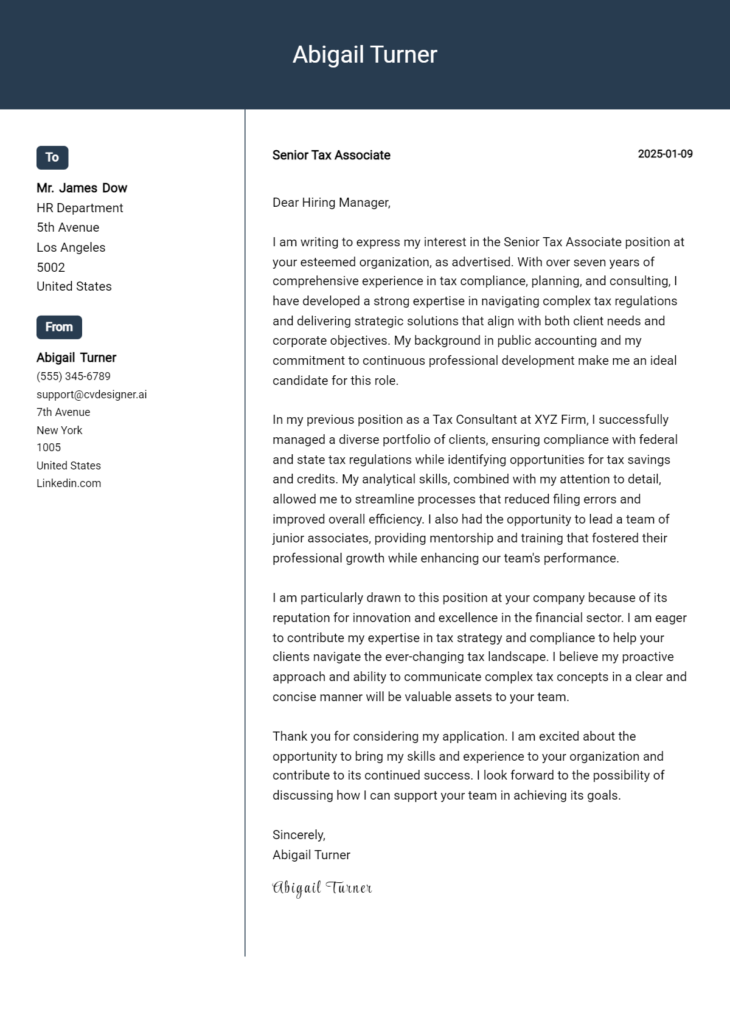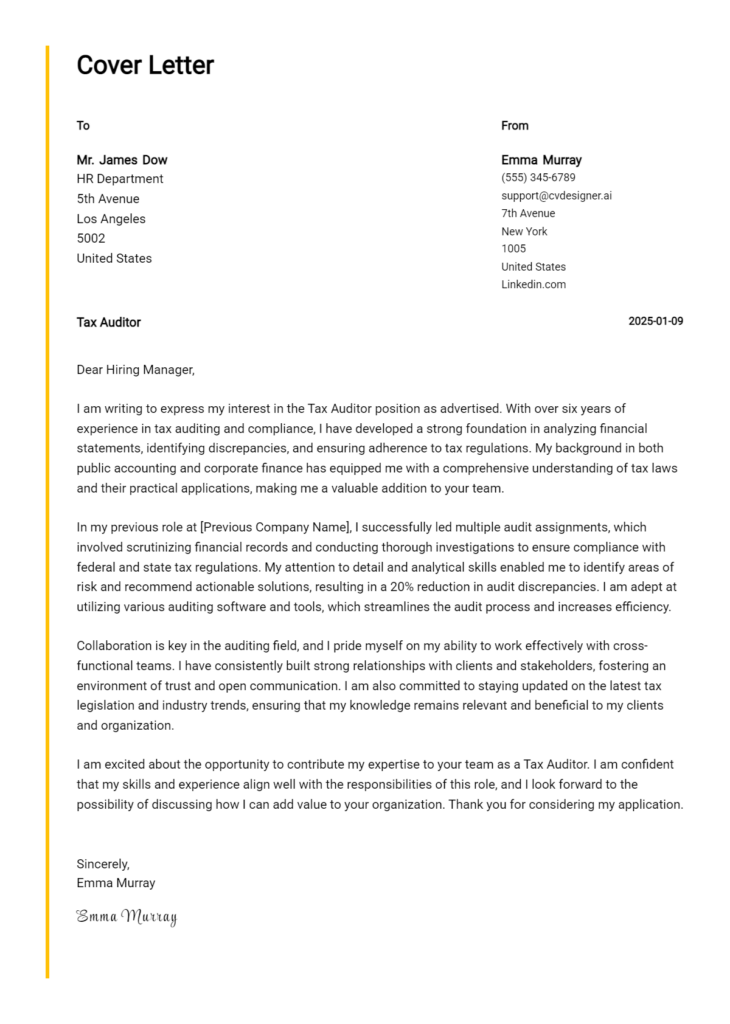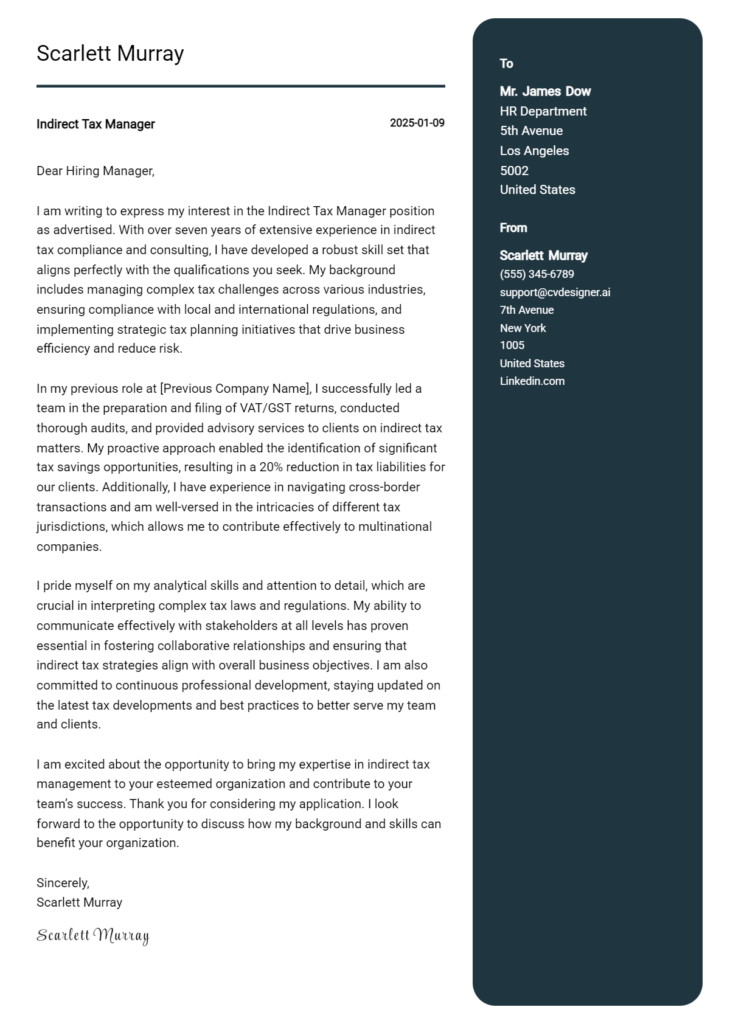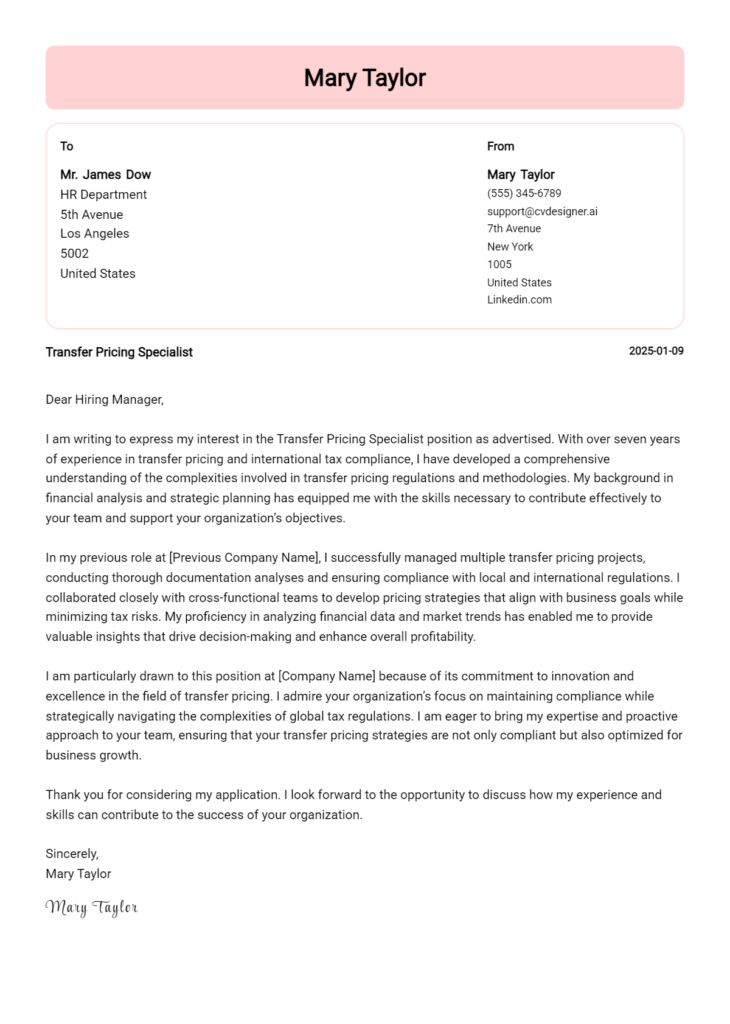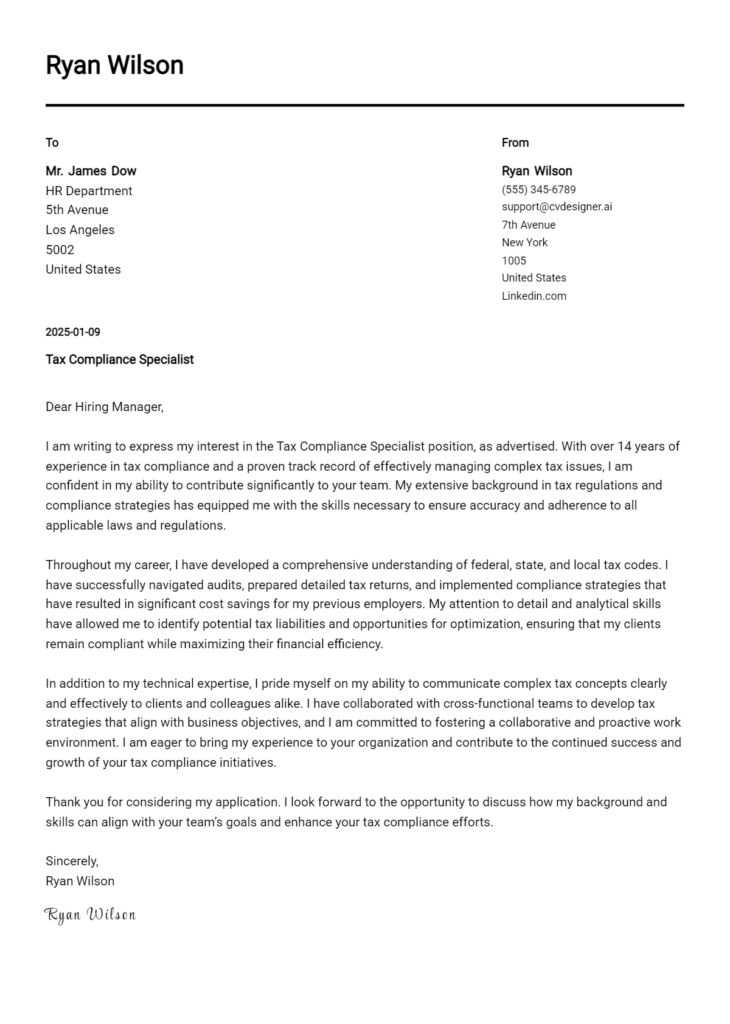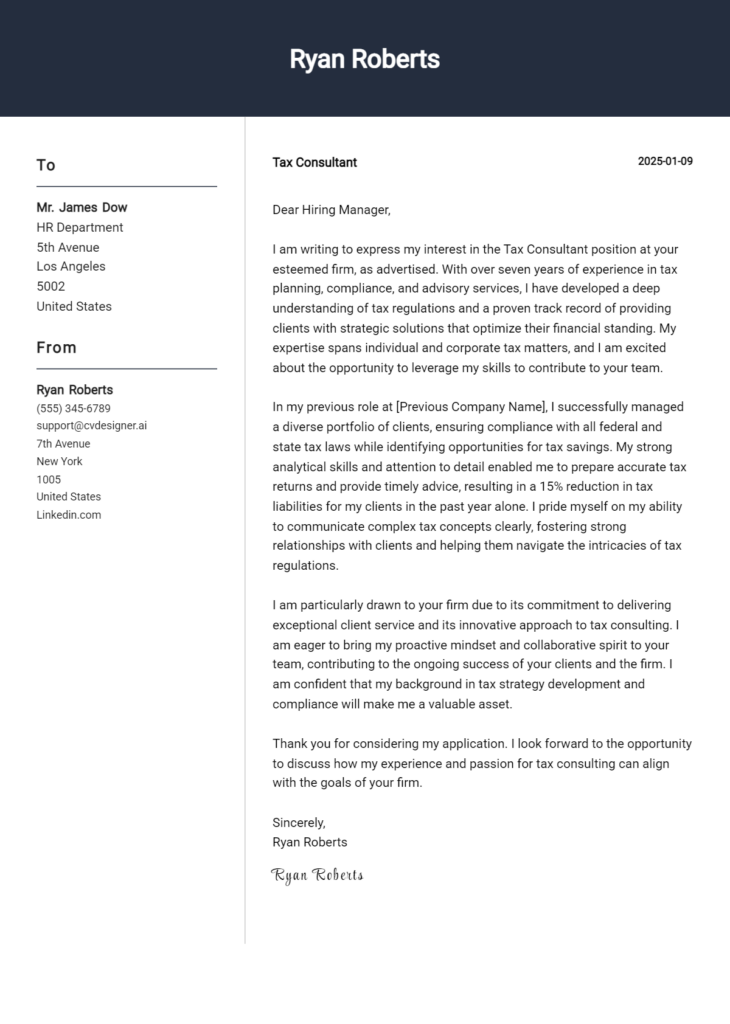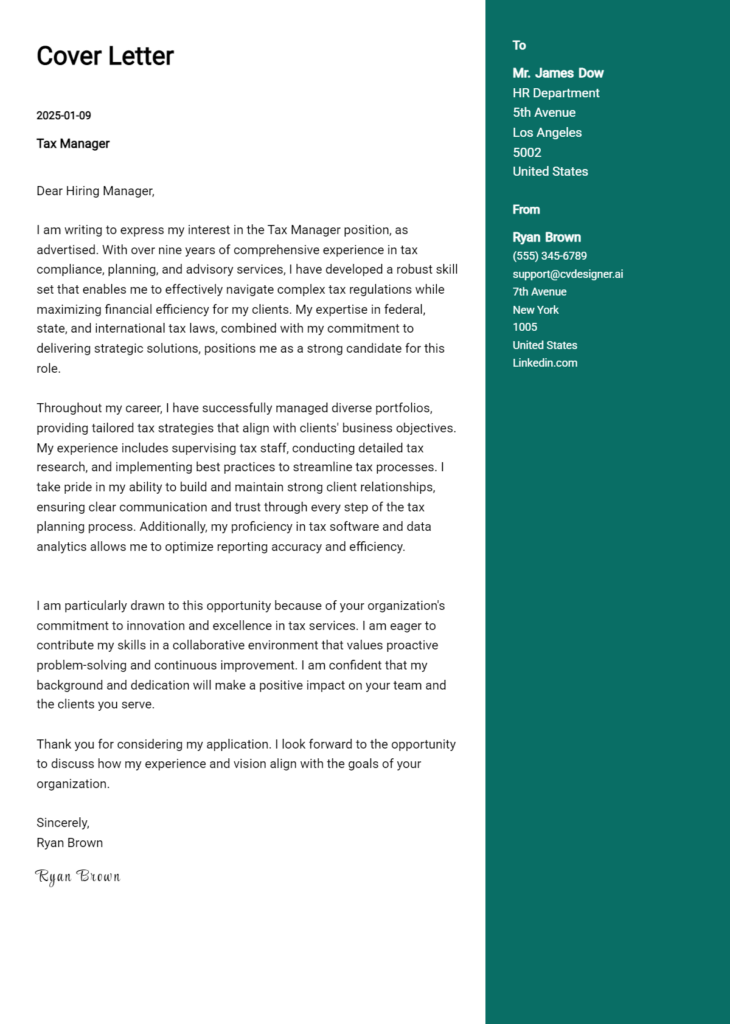Tax Policy Analyst Cover Letter Examples
Explore additional Tax Policy Analyst cover letter samples and guides and see what works for your level of experience or role.
How to Format a Tax Policy Analyst Cover Letter?
Crafting an effective cover letter for a Tax Policy Analyst position is essential, as it serves as your first opportunity to make a lasting impression on potential employers. The way you format your cover letter not only showcases your qualifications but also reflects your analytical skills and attention to detail—qualities that are paramount in the field of tax policy analysis. A well-structured cover letter can capture the hiring manager's interest while demonstrating your professionalism and understanding of complex tax issues.
In this guide, we will outline how to structure your cover letter, offering insights and specific examples to help you create a persuasive document.
We'll focus on the essential components of a professional cover letter, including:
- Cover Letter Header
- Cover Letter Greeting
- Cover Letter Introduction
- Cover Letter Body
- Cover Letter Closing
Each section plays a crucial role in emphasizing your qualifications and expertise. Let’s break down each part to help your Tax Policy Analyst cover letter shine.
Importance of the Cover Letter Header for a Tax Policy Analyst
The cover letter header is a crucial element of your application as a Tax Policy Analyst. It serves as the first impression to prospective employers, reflecting your attention to detail and professionalism. A well-structured header should include your contact information, the date, and the recipient's details. This information ensures clarity in communication and helps the employer quickly identify who the application is from and to whom it is addressed. A strong header sets a positive tone for the rest of your cover letter, while a weak one can detract from the overall professionalism of your application.
Strong Example
Jane Doe 123 Tax Lane Washington, DC 20001 jane.doe@email.com (555) 123-4567 October 1, 2023 Mr. John Smith Director of Tax Policy Department of Revenue 456 Policy Road Washington, DC 20002
Weak Example
Jane 123 Tax Lane jane@email.com 10/1/23 To Whom It May Concern
The Importance of a Cover Letter Greeting for a Tax Policy Analyst
The greeting of a cover letter is crucial as it sets the tone for the entire document. It reflects the candidate's professionalism and willingness to engage with the hiring manager on a personal level. A well-crafted greeting can create an immediate connection, making it more likely that the reader will continue to engage with the content of the letter. To demonstrate genuine interest in the position, it's essential to avoid generic greetings like "To Whom It May Concern." Instead, take the time to research and find the name of the hiring manager or the person overseeing the recruitment process. This small effort can significantly enhance the personalization of your cover letter.
Strong Greeting Example
Dear Dr. Jane Smith,
Weak Greeting Example
To Whom It May Concern,
By following these tips and examples, you can create a compelling and professional introduction that will help set a positive tone for the rest of your cover letter as a Tax Policy Analyst.
The Importance of a Well-Crafted Cover Letter Introduction for a Tax Policy Analyst
A compelling cover letter introduction is crucial for a Tax Policy Analyst, as it sets the tone for the entire application and serves as the candidate's first opportunity to make a positive impression on the hiring manager. This opening paragraph should not only capture the reader's attention but also express genuine enthusiasm for the role while briefly highlighting relevant skills or notable achievements. A strong introduction can differentiate a candidate in a competitive field, showcasing their understanding of tax policy and their ability to contribute effectively to the organization.
Strong Example
Dear [Hiring Manager's Name], I am excited to apply for the Tax Policy Analyst position at [Company Name], where my extensive background in tax law and data analysis can contribute to the innovative policy solutions your team is known for. With a Master’s degree in Taxation and over five years of experience at [Previous Company], I successfully led projects that streamlined tax compliance processes, resulting in a 15% reduction in audit risk. I am eager to leverage my expertise to help [Company Name] navigate the complexities of tax policy and drive impactful change.
Weak Example
To Whom It May Concern, I am interested in the Tax Policy Analyst job at your company. I have worked in tax-related jobs before and think I would be good at it. I have some skills that might be useful, but I’m not sure. I hope to hear back from you.
Cover Letter Body for Tax Policy Analyst
The cover letter body for a Tax Policy Analyst serves as a critical opportunity to articulate the candidate's qualifications, showcasing their analytical skills, relevant experiences, and the unique value they can bring to the organization. This section should highlight specific projects or accomplishments that demonstrate the candidate's expertise in tax policy analysis, research methodologies, and the ability to influence policy decisions. By providing concrete examples of their previous work, candidates can effectively convey their understanding of complex tax issues and their capability to contribute to the firm's objectives.
Strong Example
I am particularly proud of my role in a project that analyzed the fiscal impacts of proposed tax reforms in our state. By employing advanced econometric models, I was able to quantify the potential revenue changes and highlight the implications for various socioeconomic groups. My findings were presented to the state legislature, resulting in a more informed debate on tax equity and ultimately influencing the final legislative package. This experience not only honed my analytical skills but also reinforced my commitment to using data-driven insights to support effective tax policy decisions.
Weak Example
I have worked in tax policy for a few years and have some experience with different projects. I think I would be a good fit for your company because I am interested in taxes and policy. I have looked at some tax proposals and tried to understand them, but I don’t have any specific achievements to highlight. I am eager to learn more and contribute to your team.
Importance of the Cover Letter Closing for a Tax Policy Analyst
The closing paragraph of a cover letter is crucial as it serves to summarize your qualifications, reiterate your enthusiasm for the position, and encourage the employer to take the next steps, such as reviewing your resume or scheduling an interview. A strong closing leaves a lasting impression and reinforces your suitability for the role, while a weak closing may fail to convey your passion and may miss opportunities for further engagement.
Strong Example
Thank you for considering my application for the Tax Policy Analyst position. With a robust background in tax law and policy analysis, coupled with my passion for promoting equitable tax systems, I am excited about the opportunity to contribute to your team. I look forward to the possibility of discussing how my skills and experiences align with the goals of your organization. Please feel free to review my attached resume, and I hope to hear from you soon to schedule an interview.
Weak Example
I hope you look at my resume. I think I would be okay for the Tax Policy Analyst job. Let me know if you want to talk.
These tips will assist candidates in crafting an effective cover letter for a Tax Policy Analyst position. A well-written cover letter is crucial as it serves as your first chance to make a strong impression on potential employers. It's essential to showcase your technical skills, problem-solving abilities, knowledge of the Software Development Life Cycle (SDLC), teamwork capabilities, and a passion for continuous learning. With these elements in mind, here are five detailed tips to enhance your cover letter.
Cover Letter Writing Tips for Tax Policy Analyst
Highlight Your Technical Skills
Begin your cover letter by emphasizing your technical expertise relevant to tax policy analysis. This includes your proficiency in data analysis tools, programming languages, or tax software. Use specific examples from your previous roles to demonstrate how these skills have contributed to successful outcomes in tax policy development or analysis.Demonstrate Problem-Solving Abilities
Employers look for candidates who can address complex challenges effectively. Share a brief anecdote about a particular problem you faced in your previous work and how you approached solving it. Emphasize the analytical methods you used and the positive results that followed, showcasing your ability to tackle tax policy issues creatively and efficiently.Showcase Your Knowledge of SDLC
If you have experience with the Software Development Life Cycle, make sure to mention it. Explain how your understanding of SDLC principles has helped you in implementing technology solutions that enhance tax policy processes. This demonstrates your ability to bridge the gap between technical implementation and policy analysis, making you a valuable asset to any team.Emphasize Teamwork and Collaboration
Tax policy analysis often requires collaboration with various stakeholders, including government officials, businesses, and other analysts. Highlight your experience working in teams and how you contributed to collective efforts. Discuss any cross-functional projects you have been involved in and how your teamwork skills led to successful policy recommendations or implementations.Express a Passion for Continuous Learning
The field of tax policy is always evolving. Convey your commitment to staying updated with the latest trends, regulations, and technologies. Mention any relevant courses, certifications, or workshops you’ve attended. This not only shows your dedication to professional growth but also reassures employers that you are proactive about adapting to changes in the field.
For those looking for additional guidance, consider exploring cover letter templates and using a cover letter builder to streamline your writing process. These resources can provide you with a structured approach to creating a standout cover letter tailored to the Tax Policy Analyst role.
Common Mistakes to Avoid in a Tax Policy Analyst Cover Letter
Crafting an effective cover letter is crucial for standing out in the competitive field of tax policy analysis. Avoiding common pitfalls can significantly enhance your chances of making a positive impression. Here are some frequent mistakes candidates make and tips on how to steer clear of them:
Generic Content: Many applicants use a one-size-fits-all approach. Tailor your cover letter specifically to the job and organization by mentioning relevant skills and experiences.
Ignoring Formatting Guidelines: A poorly formatted cover letter can detract from your message. Use a professional cover letter format to ensure clarity and readability.
Overly Lengthy Letters: Lengthy letters can lose the reader's attention. Aim for a concise cover letter that highlights your most pertinent qualifications in a few impactful paragraphs.
Lack of Specific Examples: Failing to provide concrete examples can weaken your application. Use specific instances from your experience to demonstrate your expertise in tax policy analysis.
Neglecting to Proofread: Typos and grammatical errors can create a negative impression. Always proofread your letter or ask someone else to review it to ensure professionalism.
Focusing Solely on Responsibilities: Listing job duties without showcasing accomplishments can be a missed opportunity. Highlight your achievements and the impact you've made in previous roles.
Not Including a Call to Action: A cover letter without a call to action can miss the chance for engagement. Conclude with a statement expressing your enthusiasm for further discussion.
For inspiration, explore various cover letter examples that effectively showcase these principles, ensuring you present yourself as a compelling candidate for the Tax Policy Analyst position.
Cover Letter FAQs for Tax Policy Analyst
How should I structure my cover letter for a Tax Policy Analyst position?
When structuring your cover letter, start with a professional header that includes your contact information, the date, and the employer's details. Begin with a strong opening paragraph that states the position you’re applying for and briefly introduces your background. The body of the letter should contain two to three paragraphs that highlight your relevant skills, experiences, and accomplishments related to tax policy analysis. Use specific examples to demonstrate your expertise in tax legislation, economic analysis, or policy recommendations. Conclude with a closing paragraph that expresses your enthusiasm for the role and a call to action, inviting further discussion in an interview. Remember to keep your tone professional and concise throughout the letter.
What specific skills should I highlight in my cover letter?
In your cover letter, emphasize skills that are crucial for a Tax Policy Analyst, such as analytical thinking, quantitative analysis, and research proficiency. Highlight your understanding of tax legislation, compliance, and policy implications. If you have experience with data analysis software or modeling tools, mention that as well. Communication skills are critical, too, as you will need to present complex tax concepts clearly to various stakeholders. Additionally, showcasing your ability to work collaboratively in multidisciplinary teams can set you apart, as tax policy often requires input from legal, economic, and fiscal perspectives. Tailor your skills to align with the specific job description to make your case even stronger.
Should I include my educational background in the cover letter?
Yes, including your educational background is essential, particularly if you have a degree in fields like economics, finance, public policy, or law, which are relevant to tax policy analysis. In your cover letter, briefly mention your degree and any relevant coursework or projects that relate to tax policy or economic analysis. If you've completed any certifications, such as a CPA or a specialized tax policy certificate, be sure to highlight these as well. This information helps establish your qualifications and shows that you have a solid foundation in the principles necessary for the role. However, keep the focus on how your education has equipped you with the skills and knowledge to contribute effectively to the organization.
How can I make my cover letter stand out from others?
To make your cover letter stand out, personalize it by addressing the hiring manager by name and referencing the specific organization and position you are applying for. Use a compelling opening statement that grabs attention, perhaps by mentioning a key achievement or insight related to tax policy. Incorporate quantifiable achievements, such as successful policy implementations or analyses that led to significant tax savings or improvements. Demonstrate your passion for tax policy by discussing current trends or issues in the field that excite you, and how you can contribute to the organization’s goals. Lastly, maintain a professional tone while allowing your personality to shine through, making your cover letter memorable and engaging.
Build your Cover Letter in minutes
Use an AI-powered cover letter builder and have your letter done in 5 minutes. Just select your template and our software will guide you through the process.

